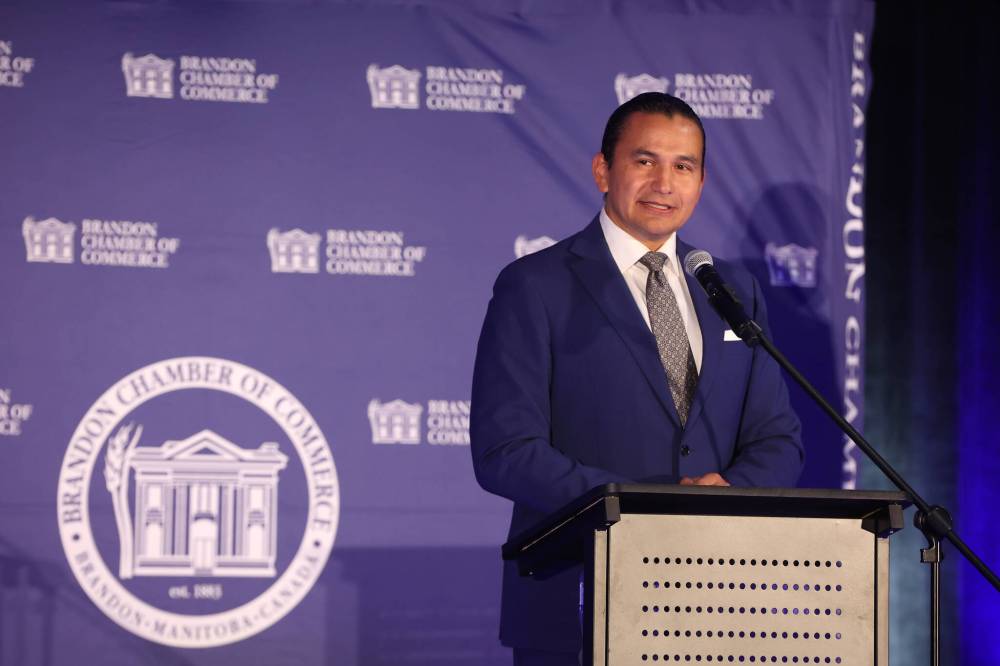NDP costed platform hinges on unspent government funds
Advertisement
Read this article for free:
or
Already have an account? Log in here »
To continue reading, please subscribe:
Monthly Digital Subscription
$0 for the first 4 weeks*
- Enjoy unlimited reading on winnipegfreepress.com
- Read the E-Edition, our digital replica newspaper
- Access News Break, our award-winning app
- Play interactive puzzles
*No charge for 4 weeks then price increases to the regular rate of $19.00 plus GST every four weeks. Offer available to new and qualified returning subscribers only. Cancel any time.
Monthly Digital Subscription
$4.75/week*
- Enjoy unlimited reading on winnipegfreepress.com
- Read the E-Edition, our digital replica newspaper
- Access News Break, our award-winning app
- Play interactive puzzles
*Billed as $19 plus GST every four weeks. Cancel any time.
To continue reading, please subscribe:
Add Free Press access to your Brandon Sun subscription for only an additional
$1 for the first 4 weeks*
*Your next subscription payment will increase by $1.00 and you will be charged $16.99 plus GST for four weeks. After four weeks, your payment will increase to $23.99 plus GST every four weeks.
Read unlimited articles for free today:
or
Already have an account? Log in here »
Hey there, time traveller!
This article was published 28/09/2023 (790 days ago), so information in it may no longer be current.
The NDP has released its costed campaign platform, showing how it would increase spending on health care, education, clean energy and affordability without raising taxes and while balancing the books.
“We’re simply using unallocated funds within the existing provincial budget to fix health care and lower costs for you,” NDP Leader Wab Kinew said at a news conference Thursday in Winnipeg, with the Manitoba Legislative Building in the background.
The New Democrats’ new spending promises — adding up to $582.5 million in their first proposed budget — will be paid for by reallocating $523.5 million in unspent “contingencies and unanticipated events” money in the Progressive Conservatives’ 2023 budget, and by redirecting $66.1 million under-spent on various funds.
“We’re simply using unallocated funds within the existing provincial budget to fix health care and lower costs for you,” NDP Leader Wab Kinew said at a news conference Thursday. (Tim Smith / The Brandon Sun Files)
The NDP says it would end up with a $7-million budget surplus and put it toward deficit reduction. By the end of the four-year term, they project a $1-million surplus.
“Our plan is reasonable, it’s focused on the future and it leads to that balanced budget within a first term,” Kinew said. “We built this platform by listening to Manitobans who felt ignored by (Tory Premier) Heather Stefanson’s government and put them into policies that would benefit you.”
NDP leadership said the party is not going to touch the $200-million planning contingency set aside in the 2023 budget’s fiscal outlook.
Kinew said there will still be a firm “cushion” in case of unforeseen events, such as a public health emergency or climate change fallout, including wildfires.
“There are two separate areas in the budget. One is a contingency fund which we’re leaving intact. Then you have unallocated funds which, right now, are used (by the PCs) to mail out cheques or do a giveaway to large corporations,” Kinew said.
Under the PC government (in power since 2016), money budgeted for contingencies and unanticipated events “ballooned” to more than $500 million, “so that when the end of the fiscal year came around, they could do whatever initiative that they pleased,” the NDP leader said.
“The premise of our plan, of our document, is that it’s more fiscally responsible. It’s more transparent if we tell you right now that we’re going to use those funds for health care, to lower costs for your family,” Kinew said.
“We struck a balance here. We’re still preserving a cushion to respond to unforeseen events that will inevitably arise, but we’re also going to ensure that there’s more transparency by spelling out in greater detail how we’re going to invest in health care and how we’re going to invest in the economy.”
The NDP plan got mixed reviews, with the left-leaning Canadian Centre for Policy Alternatives wary and the Canadian Taxpayers Federation commending Kinew’s goal of balancing Manitoba’s books.
“By agreeing to the massive 2023-24 budget tax cuts, if elected, the NDP has limited revenue available to address pressing problems facing Manitoba,” said Molly McCracken, director of the CCPA Manitoba office.
“By agreeing to the massive 2023-24 budget tax cuts, if elected, the NDP has limited revenue available to address pressing problems facing Manitoba,” said Molly McCracken, director of the CCPA Manitoba office. (Winnipeg Free Press Files)
“The NDP’s plan to use unallocated funds to cover their major campaign promises adds up, but by committing to maintain tax cuts and balance the budget in four years they have left themselves with little wiggle room, apart from the $200-million contingency fund created under (former premier Brian) Pallister,” McCracken said in an email.
“Under these constraints, a sudden economic slowdown or change in federal transfers would be harder to navigate.”
The Canadian Taxpayers Federation applauded the NDP for releasing a costed platform and aiming to balance the budget with a surplus at the end of its first term.
“The province is more than $30 billion in debt and it’s costing taxpayers a billion dollars in interest charges every year,” spokesman Gage Haubrich said from Saskatoon. “At least it’s an issue on their mind is good to see.”
However, relying on a contingency fund to pay for program spending is a “slippery slope.”
“The surplus needs to come from cutting spending in other areas if they want to invest in other priorities. A good place for them to start would be all the corporate welfare that the current government introduced in Budget 2023,” he said, citing the $50-million venture capital fund and tens of millions for economic development loans and the Manitoba Mineral Development Fund, as examples.
On Thursday, the PCs said they’d release a fully costed campaign document “in the coming days.”
On Friday, the government will release the public accounts — Manitoba’s annual report card, with statistics and indicators showing the fiscal health of the province for the year ended March 31.
Legislation requires the annual information be released by Sept. 30. The report isn’t included under the election communications blackout.
Meantime, the Tories slammed the NDP plan.
The unallocated contingencies it wants to spend on health care were placed in the budget to prepare for the many labour agreements the government negotiated this year, PC spokesman Shannon Martin said in a prepared statement.
“Contingencies are responsible fiscal management, not free money for Wab Kinew to spend on his election promises. The NDP’s zero experience in government shows.”
Earlier, Kinew called on the PCs to show how they’d pay for $1 billion in new spending promises they’ve rolled out ahead of the election.
He also offered some details about a potential inquiry into Manitoba’s COVID-19 response.
Kinew said the $1.6-million platform promise would be an “expert-led” inquiry into the pandemic to learn from it and prepare for the future.
“Anytime you go through something as life-changing as a pandemic, I think it makes sense to spend a bit of time asking what went wrong, what went right, what do we need to do in the future?” he said.
“I don’t want an inquiry to be about assigning blame or pointing fingers.”
carol.sanders@freepress.mb.ca

Carol Sanders
Legislature reporter
Carol Sanders is a reporter at the Free Press legislature bureau. The former general assignment reporter and copy editor joined the paper in 1997. Read more about Carol.
Every piece of reporting Carol produces is reviewed by an editing team before it is posted online or published in print — part of the Free Press‘s tradition, since 1872, of producing reliable independent journalism. Read more about Free Press’s history and mandate, and learn how our newsroom operates.
Our newsroom depends on a growing audience of readers to power our journalism. If you are not a paid reader, please consider becoming a subscriber.
Our newsroom depends on its audience of readers to power our journalism. Thank you for your support.

















